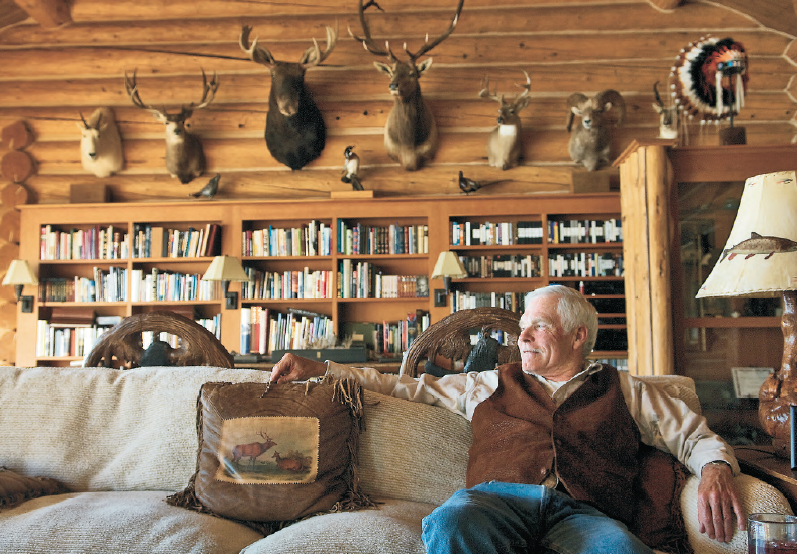
Ted Turner’s plans include goading other donors to join his campaign to save the world
Ted Turner has never wanted for ambition. As a yachtsman, he captured the America’s Cup, sailing’s highest honor. As a businessman, he founded the first 24-hour television news station and went on to build a broadcast-media empire. And six years ago, at 63, Mr. Turner helped create a restaurant chain to save bison and inject environmentalism into the restaurant business.
His philanthropy has likewise been characterized by outsize aspirations. In 1997 Mr. Turner famously shocked the nonprofit world by promising $1- billion to benefit the United Nations.
Four years later, he pledged up to $250-million—roughly $70-million of which he has paid—to create a charity that seeks to prevent nuclear warfare.
He has also given more than $135-million to the Turner Foundation, an Atlanta grant maker that supports environmental causes.
Mr. Turner’s giving has sometimes fallen short of expectations, both because of his stock-market losses and the loftiness of his goals. And while he is still a billionaire who intends to give away the bulk of his fortune—worth about $2.3-billion, compared with a high of nearly $10-billion in 2000—he’s taken on the role of evangelist in recent years, exhorting those with deeper pockets to join him in the causes he’s most passionate about, such as controlling nuclear
proliferation, curbing population growth, and slowing global warming.
The United Nations Foundation, which Mr. Turner founded in 1998 with the expectation that it would close after a decade, has now embraced ambitious fund-raising plans to help transform it into a permanent institution.
Mr. Turner says he sees his philanthropy as fighting threats that could imperil humankind.
“I’ve never looked at this as giving money away,” he says. “I see it as investing in the future of humanity.”
Starting ‘Small’
Mr. Turner says he started thinking about philanthropy around the time he began making money in a big way. He created the Turner Foundation in 1990 with $2.5-million.
“I started in a very small way with the Turner Foundation, but it grew very fast
as my wealth grew,” he says. “I grew it as fast as I could.”
Passionate about the outdoors since his childhood, Mr. Turner chose to focus on environmental causes.
Laura Seydel, his eldest daughter, recalls how her father would weed the lawn by hand with his children instead of using chemicals. He traded his Cadillac for a Toyota Corolla during the 1973 oil embargo and today drives a hybrid Toyota Prius.
Mr. Turner’s son Teddy says that Jane Fonda, the actress and political activist
whom Mr. Turner started dating in the late 1980s and married in 1991, also
played a role in helping him create the foundation and shaping his views on philanthropy. (The couple divorced in 2001.)
“She had a big influence on Ted and on all of us,” says Teddy Turner, who owns a boatyard in Charleston, S.C. “I’m not sure he wouldn’t have done it on his
own, but she certainly accelerated it.”
One of Mr. Turner’s aims in creating the foundation was to involve his children
in philanthropy. All five are on its board, and one of Mr. Turner’s grandchildren serves as an honorary trustee. Mr. Turner’s $1-billion pledge to U.N.causes, however, was what defined him as a philanthropist. That gift is often credited with setting a new bar for big donations.
Around the same time, Mr. Turner sought to shame other billionaires into giving more of their money. He slammed Forbes magazine’s list of the 400 richest
Americans and urged the creation of a list of the biggest donors. Slate, BusinessWeek, and this newspaper now publish such lists. “It definitely has had an impact,” Mr. Turner says of the lists, noting that he believes the richest people are giving twice as much as they did a decade ago. “Some people still don’t give. But many do.”
While Mr. Turner says he sees many of the country’s biggest philanthropists
giving away their money wisely, he is loathe to take credit. “You’d have to ask them,” he says of what motivated his fellow billionaires to give. “But they are doing greatthings. Bill Gates, Warren Buffett,they are doing great things.”
To read the full article please download the PDF
Originally published in The Chronicle of Philanthropy June 2008


















